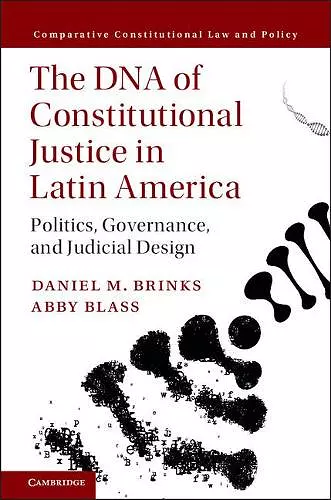The DNA of Constitutional Justice in Latin America
Politics, Governance, and Judicial Design
Daniel M Brinks author Abby Blass author
Format:Paperback
Publisher:Cambridge University Press
Published:8th Aug '19
Currently unavailable, and unfortunately no date known when it will be back

Analyzes the political roots of the systems of constitutional justice in Latin America, tracing their development over the last 40 years.
This book traces the development of constitutional courts in Latin America, and develops concepts such as judicial autonomy and authority. It aims to understand the design of judicial institutions and combines qualitative and quantitative evidence to explore the basic purpose of constitutional justice.In recent times there has been a dramatic change in the nature and scope of constitutional justice systems in the global south. New or reformed constitutions have proliferated, protecting social, economic, and political rights. While constitutional courts in Latin America have traditionally been used as ways to limit power and preserve the status quo, the evidence shows that they are evolving into a functioning part of contemporary politics and a central component of a system of constitutional justice. This book lays bare the political roots of this transformation, outlining a new way to understand judicial design and the very purpose of constitutional justice. Authors Daniel M. Brinks and Abby Blass use case studies drawn from nineteen Latin American countries over forty years to reveal the ideas behind the new systems of constitutional justice. They show how constitutional designers entrust their hopes and fears to dynamic governance systems, in hopes of directing the development of constitutional meaning over time.
'For some thirty years now, constitutional politics in general and, more specifically, the performance of higher courts, have become topics of primary public importance in Latin America. In spite of this, however, until now we did not have a critical and systematic study of these issues. Daniel M. Brinks and Abby Blass's book not only fills this void, but it does so on the basis of magnificent empirical work, and offering theoretical reflections on the subject that place this work in the vanguard of existing analyses of constitutional politics.' Roberto Gargarella, Universidad Torcuato Di Tella, Buenos Aires
'Daniel M. Brinks is one of the world's leading scholars of judicial politics in the Global South. In The DNA of Constitutional Justice in Latin America, he and Abby Blass offer an innovative and compelling account of the origins of different models of constitutional justice in Latin America since the 1970s. They explain why some justice systems are much more autonomous in relation to the executive than others, and why some have constitutionalized a much wider range of issues than others. The DNA of Constitutional Justice in Latin America offers important conceptual, theoretical, and empirical contributions.' Scott Mainwaring, Jorge Paulo Lemann Professor for Brazil Studies, Harvard Kennedy School of Government
'The increasing political importance of courts and constitutional justice, raises urgent questions about the nature of judicial power. Brinks and Blass offer fresh insights by skilfully combining legal analysis with institutional theory and political economy perspectives on constitution-making - literatures that otherwise rarely speak. They show why we need to pay careful attention to 'the DNA of constitutional governance' - the institutional design inscribed in the constitutional text, that establishes the judges' autonomy and scope of authority - and to the power dynamics and motives that gave rise to these provisions and the coalitions that sustain them. With a rare combination of conceptual innovation, theoretical sophistication, rigorous quantitative analysis, and fine-grained case studies, the book is highly relevant for all scholars and students interested in constitutional governance. It is invaluable for anyone who care about constitutional politics and governance in Latin America - and is a model for similar studies elsewhere.' Siri Gloppen, Universitetet i Bergen, Norway and Research Director, Chr. Michelsen Institute (CMI), Norway
ISBN: 9781316630914
Dimensions: 245mm x 170mm x 15mm
Weight: 500g
280 pages